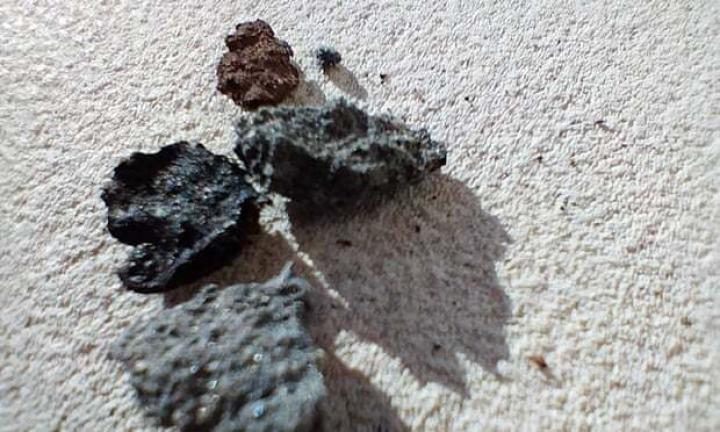21.02.2023
Object hit balcony in Matera and remnants in pristine condition – ‘almost as if we collected it directly from space’, says expert

Residents of southern Italy’s picturesque and ancient “city of stone” have been gripped by another rocky phenomenon after a meteorite crash-landed on the balcony of a home in Matera’s suburbs.
The space object, which had been travelling at about 200mph, was spotted in the skies above the Puglia and Basilicata regions on 14 February, becoming known as “Valentine’s fireball”, before falling on to the balcony of the home of brothers Gianfranco and Pino Losignore and their parents.
Not that they realised at first: the two were carrying out checks on the property’s solar panels when, three days later, they noticed a damaged panel and tile, along with grey fragments scattered across the balcony.
“I wasn’t at home when it happened, but my mother was in the basement at the time and heard a loud bang,” said Gianfranco. “She was worried, but it was quite a windy day and so thought it might have been the branch of a tree. Never would we have expected it to have been a meteorite.”
The meteorite’s fireball had been observed on the surveillance cameras of Prisma, a project run by the Italian institute of astrophysics, enabling experts to track where it might have fallen.
More than 70 grams of the fragments have so far been gathered for study, which will eventually be put on display in a museum.
Carmelo Falco, a representative of Prisma who travelled to Matera straight away, said that while many meteorites hit the Earth, what is rare about the event in Matera is that the meteorite landed on a clean surface, so it has not been contaminated.
It is also rare for meteorites to fall in an area from which their fragments can be easily recovered.
“We have to analyse the remnants of the meteorite, but what is unique with this one is the situation in which it was found,” said Falco. “The material, which is soft, much like sand, is very pure, as it did not touch soil or water – it is almost as if we collected it directly from space.”
This is the second time in recent years that a meteorite has fallen in Italy. In January 2020, one was found near Modena in Emilia-Romagna.
Domenico Bennardi, the mayor of Matera, a city famous for its sassi, cave dwellings carved out of limestone, said the discovery had triggered much “enthusiasm and emotion” among residents.
“Matera is one of the oldest cities in the world, where many discoveries have been made,” he said. “It’s incredible that fragments of rock from space have now fallen on the city of stone.”
The meteorite will be named after Gianfranco and Pino.
Quelle: The Guardian
